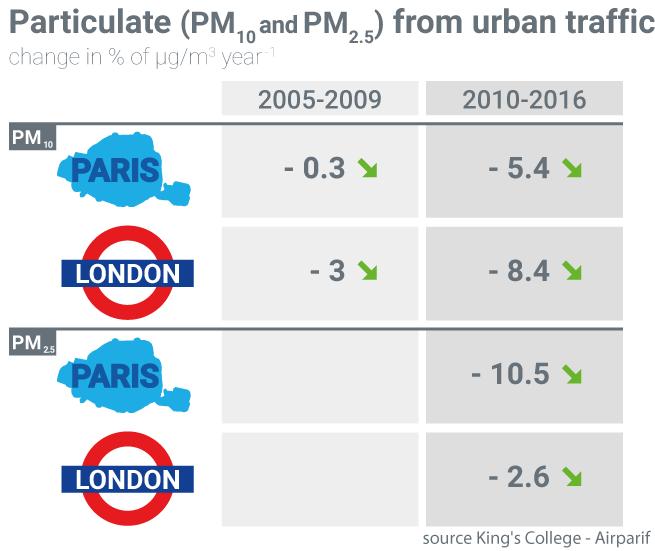
Credit: King’s College London and Airparif
For the first time, a joint air pollution study across two mega-cities – London and Paris – measures the impact of policies designed to reduce air pollution from urban traffic over the last 12 years.
In a paper, published today in the journal Environmental Pollution, researchers from King’s College London and Airparif found that despite efforts, both cities do not meet legal limits for nitrogen dioxide and airborne particle pollution set by the World Health Organisation.
Many polices are in place to combat air pollution at European-wide, city-wide and local scales. This study found that since 2010, these have led to improvements in nitrogen dioxide and particle concentrations across both cities.
However, the rate of change has not been enough to achieve compliance with legal limits. They note that nitrogen dioxide from traffic in London has deteriorated alongside some roads.
Looking at two time periods, 2005-2009 and 2010-2016, they also found that:
- As the legal compliance approached in 2010, nitrogen dioxide in both cities was getting worse and not better. Despite passing ever tighter laboratory tests, new diesel cars failed to achieve anticipated reductions when driven on the roads. This suggests that if feedback between air pollution surveillance and policy makers was better, it could have allowed for a more agile response, as conditions changed from the expected trajectory.
- From 2010 to the end of 2016, the large decline in particle pollution in London and Paris can be explained by the implementation of the Euro 5 standards on diesel cars and vans.
- There is some evidence that the introduction of newer diesel lorries and buses manufactured after 2009 lead to decreased nitrogen dioxide.
- In London, schemes to update bus fleets lead to rapid improvements alongside some roads. However, an increase in motorcycles in London since 2010 may have offset some of the improvements from other vehicle types. This highlights the less stringent exhaust standards applied to motorbikes compared with other vehicles.
Dr Gary Fuller, air pollution scientist at King’s College London said, “The diesel emissions scandal had a serious impact on air pollution in Europe’s two mega-cities. Even though new cars passed ever tighter exhaust tests, many emitted much more pollution when driven on our roads. This has led to chronic and widespread problems with limits for nitrogen dioxide.
“A clear lesson here the need for better feedback to make sure that our air pollution polices remain on track. There have been some successes in London and especially with the bus fleet. Although we are now heading in the right direction; we need stronger policies, such as London’s forthcoming ultra-low emission zone, to improve air pollution quickly for everyone in our cities, and we need to check that they work.”
###
Media Contact
Tanya Wood
[email protected]




